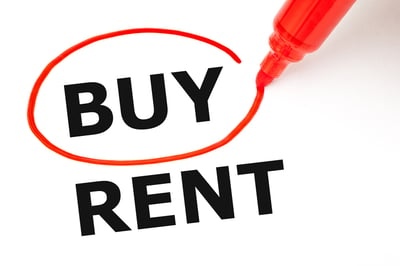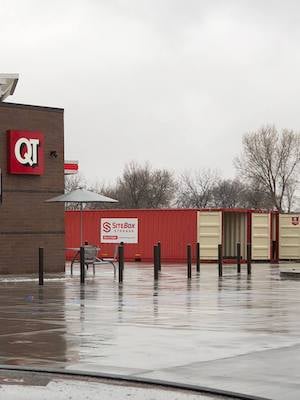Seven Things That Affect The Cost Of Buying Portable Storage Units

Routines are the great two-edged swords of life. On one hand, falling into positive routines can lead to better health and financial success. On the other hand, routines can trap you into a pattern with no progress.
 Renting equipment is a great option when appropriate, but this can easily fall into the routine where you end up paying as much as, or more than the equipment would've cost. If you have been repeatedly renting portable storage units for your business, it may be time to look into a purchase. This article explores some of the considerations to make while you're googling, "How much does it cost to buy a portable storage container?"
Renting equipment is a great option when appropriate, but this can easily fall into the routine where you end up paying as much as, or more than the equipment would've cost. If you have been repeatedly renting portable storage units for your business, it may be time to look into a purchase. This article explores some of the considerations to make while you're googling, "How much does it cost to buy a portable storage container?"
Eight Things To Consider When Buying a Mobile Storage Container
1. Long-Term On Site Storage Needs
One of the first questions about the purchase of mobile storage units is how much space you need. Like many products, the larger the storage container you purchase, the greater the cost. The temptation is to buy the minimum sized storage you currently need.
While this approach will likely save you money in the near future, it will cost more money later on. The most effective purchasing decision must include long-term storage needs. It is good to have more space than you need.
2. Finding quality in a Weatherproof Storage Structure
One of the other questions researchers must ask is how much "quality" to purchase.  Product quality can be an interesting phenomenon. Sometimes paying a premium results in a better item. In other cases, it leads to a bigger loss. The key is to know what elements of quality are worth the extra money.
Product quality can be an interesting phenomenon. Sometimes paying a premium results in a better item. In other cases, it leads to a bigger loss. The key is to know what elements of quality are worth the extra money.
If a storage option is weatherproof is a great example of a worthwhile measure of quality. Water, snow, and other forms of moisture can significantly reduce the life of your stored materials. Rust, mold, rot, and warping can all ruin inventory.
"Storage shed" options that are very cheap, but not weatherproof, can end up costing more in the long run, due to the lost of both stored materials and eventually the storage shed itself.
3. Buying Outright Vs Rent-To-Own Storage
For cash-flush businesses, it may be easier to commit to an outright purchase of the storage container. However, this strategy could also lead to purchasing a smaller or cheaper unit than is needed.
Rent-to-own agreements may be perfect for those who want to purchase a larger unit, but don't have the funds up front.
4. Storage Extras
Once you make a decision about the size and type of mobile storage to purchase, you also have to consider extras. Again, be sure to make the decision based on what you may need for the life of the product. In general, there are two categories of options to consider.
Permanent options are those extras that must be decided upon purchase. For example, some mobile storage units come with only one door, while others have doors at both ends. If you suspect that you may need to root through the storage to find a specific item, you may want the dual door option. Otherwise, you may have to remove everything through the single swinging door to access items in the back.
The other category is those that can be purchased at a later date. Pipe racks, 3-tiered shelves, and wall dividers may all be purchased and installed afterward. Please note, this option may require clearing the unit and installation fees.
5. Long-Term Location
This one may not be a direct cost, but it is worth considering. One of the potential issues with long-term on site storage is the need for a stable location. Most companies will not attempt to move a full container. Accordingly, there are some things to analyze regarding the eventual location of placement.
-
The ground must be stable, level, and not prone to sinking. Heavy containers in place for years can potentially sink or shift into soft ground. This shifting can potentially damage the structural integrity of the unit or cause door jams.
-
Do not place the unit within a floodplain, or locations where recent memory recalls standing water. While the unit itself is watertight, water can cause sinking or shifting. The unit is also not designed to protect against being submerged underwater.
-
Considerations such as security, access to inventory, and local ordinances should all be well researched before placement.
6. Transportation
The transportation of the storage unit is often the most expensive part of the unit rental process. Repeat renters with remote locations may find making one final purchase more cost-effective. Since deliveries are often made from distribution centers and not retail facilities, you may need to contact a company to estimate delivery costs.
7. Storage Container Condition
Most cost-conscious business owners opt to buy used storage containers. Like any used item, the condition of the container will definitely impact the cost. While all containers will securely store your inventory, you will pay less for old, faded, or dinged units. If the outward appearance is not an issue, you may even consider asking for units with maximum wear and tear.
Pulling the Trigger
As much as we often want to think things through ourselves, it is often impossible to determine actual costs in independent research. Before you make a decision about a purchase or rental, contact a reputable mobile storage company for a quote. Let the storage experts help you work out the specifics based on their experience and your needs.
SiteBox Storage has been in the container storage business since 1998 and our helpful sales staff can talk to you about current stock and rent-to-own options!


